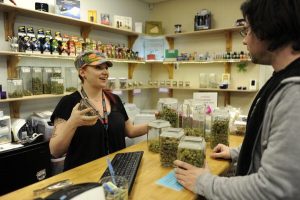John Fritzel was doing very well in the mid 2000s. He ran a Subway restaurant franchise, he had a soaring real estate business, and his finances were booming.
 And then, in 2008, it all came crumbling down. He filed for bankruptcy following a string of losses that dovetailed with the massive financial crash at the end of the Bush administration. Business and life didn’t look especially promising for Fritzel.
And then, in 2008, it all came crumbling down. He filed for bankruptcy following a string of losses that dovetailed with the massive financial crash at the end of the Bush administration. Business and life didn’t look especially promising for Fritzel.
But over the next few years, and with the benefit of legalization, that changed. After another failed effort, this time in baby products, Fritzel made a leap to something that finally stuck: legal marijuana. His new company, LivWell Enlightened Health, is already expanding to other states where cannabis has been legalized for recreational use.
“The music just stopped and there weren’t any more chairs,” he said.
Fritzel declared bankruptcy aged 35
By the time he declared bankruptcy, he was just 35 and owned roughly $1.2 million in real estate assets. He also owed more than $9.2 million, the cost of huge loans and business obligations stretched across more than 30 companies. He had no cash left in his own bank account.
“After going bankrupt, there were pretty big battle scars,” he said. “It was the best thing that ever happened to me. Being so dependent on market forces was something I just couldn’t do again.”
So Fritzel joined with two fellow real estate brokers, Steve Brooks and Thomas Van Alsburg, who were also close friends, and launched a medical marijuana dispensary in 2010: Heartland Pharmacy of Denver. They have since changed the name to Lightshade Labs.
“It was either that or get a job, which for me is not an option since I don’t handle authority too well,” he said. “My retail background in Subway and its structured franchise was great training.”
Cash flow issues followed launch of MJ business
 But the move wasn’t easy by any stretch. Fritzel and his friends quickly discovered that cash didn’t flow as abundantly as industry gossip had promised. Their success came from hard work – exactly the kind of hard work that led to his earlier victories in the restaurant and real estate industries.
But the move wasn’t easy by any stretch. Fritzel and his friends quickly discovered that cash didn’t flow as abundantly as industry gossip had promised. Their success came from hard work – exactly the kind of hard work that led to his earlier victories in the restaurant and real estate industries.
That work included 16-hour days, plus a cheap ad that drew in 300 customers the same day it ran, customers who spent more than $5,000 on marijuana. Soon the business partners opened a second shop and bought out one of their earliest investors. That gave them a major ownership stake in their own business.
“It just mushroomed out after that,” Fritzel said.
But he soon lost as much as he had gained. His family opposed his profession and disowned him, he said. They are successful real estate brokers in Iowa and Denver, and he has little to do with them anymore.
“My involvement in this business is completely unacceptable to my parents, to the point that they have disowned me and do not speak to me because of it,” he said. “No matter what position or explanation I give them, they view me as a drug dealer. Period.”
Fritzel’s business continues to grow
That hasn’t stopped his rise, however. He now co-owns four Denver marijuana businesses: Lightshade Labs, Buddy Boy, PotCo, and MJardin. He has a controlling interest in 32 Denver licenses for legal weed companies.
The shops employ roughly 400 people, a number that could grow to 1,000 by the start of 2017. “There’s no reason,” Fritzel said, that he and his partners shouldn’t be able to bring in at least $250 million in sales by 2018 if other states pass legalization in November.
“It’s a billion dollar market whether I’m here or not,” he said. “If it’s not me, then it would be someone else.”
















